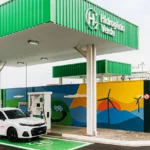The global energy transition is well underway, and green hydrogen is emerging as a key player in this scenario. Produced from renewable sources, it is seen as a key solution for decarbonizing industrial and transportation sectors. Europe, in its quest for energy security and emissions reduction, is turning its attention to Brazil, a country with vast potential for producing this clean fuel.
Opportunities that connect continents
Brazil reached 93.1% of electricity generation from renewable sources in 2023. Hydroelectric, photovoltaic and wind power have contributed to the country's electricity grid continuing to stand out as one of the cleanest in the world. This abundance of clean energy positions the country as an ideal candidate for the competitive production of green hydrogen.
Furthermore, Brazil's strategic location, with ports facing the Atlantic, facilitates exports to the European continent, reducing logistics costs and delivery times.
Ongoing projects: from paper to reality
Several initiatives are already underway to consolidate Brazil as a supplier of green hydrogen:
- Eletrobras, Sefe and EnerTech: Partnership signed to produce up to 200,000 tons of green hydrogen in Brazil, with exports scheduled for Europe from 2030 onwards.
- Green Energy Park (GEP): Project in Piauí with an investment of €2 billion from the European Union, aiming at the production of green hydrogen and ammonia to supply the European market.
- House of Winds and TotalEnergies: Development of a plant in the Port of Pecém (CE) with a capacity of 1.2 GW of electrolysis, aiming at the production of green hydrogen for export.
Challenges and paths to follow
Despite its potential, Brazil faces challenges in consolidating itself as a strategic supplier:
- Regulation and certification: Need to establish clear rules aligned with international standards to guarantee the traceability and sustainability of the hydrogen produced;
- Logistics infrastructure: Investments in ports, pipelines and storage systems are essential to enable large-scale exports;
- Financing and incentives: Public policies that encourage investment and public-private partnerships can accelerate the development of the sector.
The role of Brazilian companies
National companies play a crucial role in this process. Unigel, for example, plans to build a green hydrogen plant in Bahia, focusing on the production of green ammonia for export.
Furthermore, more than 40 projects in the country seek certification for green hydrogen production, aiming to meet European demand.
The truth is that Brazil has unique conditions to become one of the main suppliers of green hydrogen to Europe. With abundant natural resources, a strategic location and initiatives already underway, the country has the opportunity to lead this new energy frontier.
For companies and investors, this is the right time to position themselves in this emerging market, contributing to the global energy transition and driving sustainable economic development.
Ready to position your company in the international green hydrogen market?
Bring Consulting is ready to help your organization explore emerging opportunities in the clean energy sector. With expertise in international business development, we can help your company stand out in this promising scenario.
Contact us and find out how to transform potential into concrete results.


